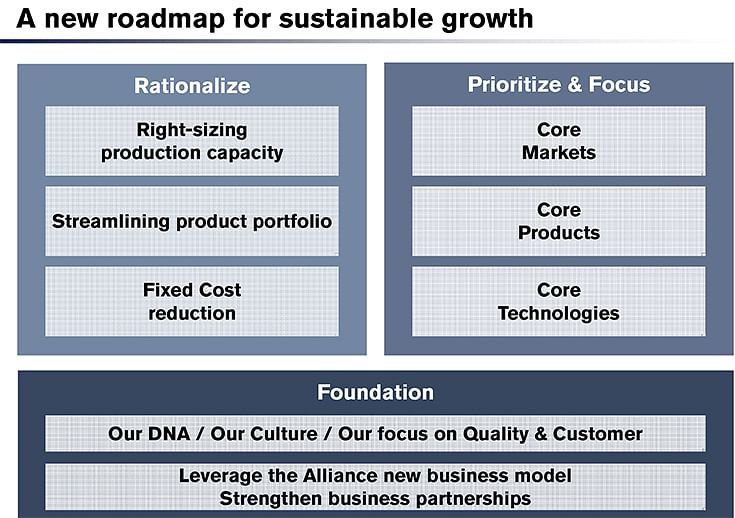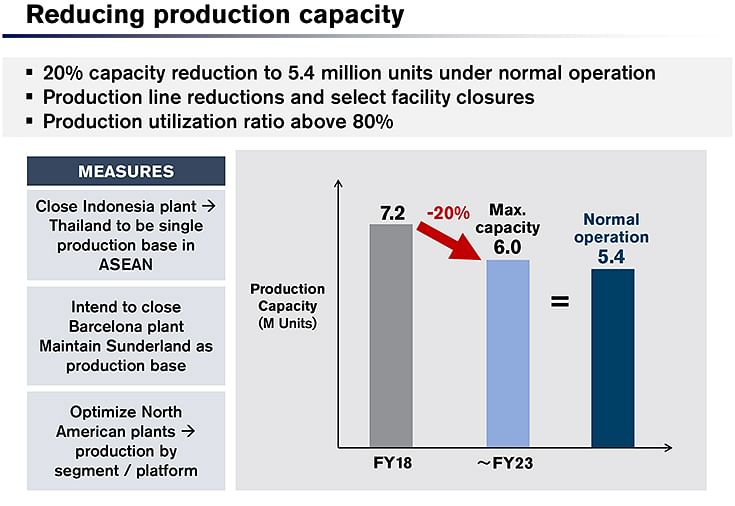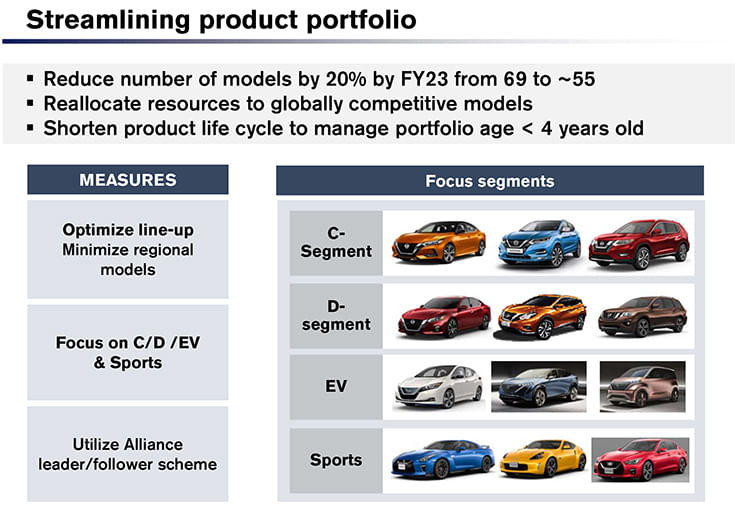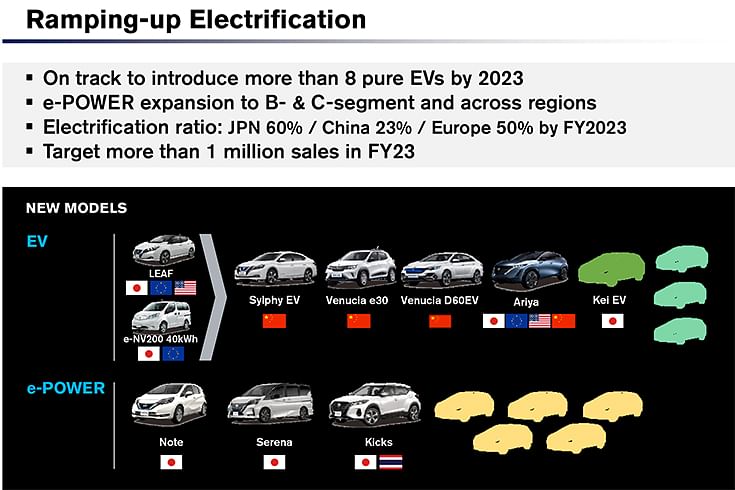Nissan to slash global production and models by 20% by FY2023
Japanese carmaker to take decisive action to transform business by streamlining unprofitable operations and surplus facilities, alongside structural reforms.
Japanese carmaker Nissan Motor Corporation today held its annual general meeting in Yokohama, Japan, and while the company announced its FY2019 financial results, it also unveiled a new business transformation plan.
The four-year plan to achieve sustainable growth, financial stability and profitability by end FY2023, revolves around fixed-cost rationalisation and reducing excess production capacity, which it built as per its mid-term plan of 2011, anticipating high global sales growth.

The company closed FY2019, with net revenue declining 14.6 percent to 9,878.9 billion yen (Rs 681,644 crore), as against 11,574.2 billion yen (Rs 798,620 crore) in FY2018. Even though, the total industry volumes dropped 6.9 percent to 85.73 million units (FY2018: 92.09), its market share stood at 5.8 percent globally.
In the current scenario, while the coronavirus pandemic has “deeply impacted” its business due to the slowdown in China and stagnation of global markets, Nissan is in a relatively secure position to tide over through the storm. The company announced having net cash-in-hand of close to 1.1 trillion yen (Rs 75,900 crore) and was also able to raise funds of 712.6 billion yen (Rs 49,169 crore) which should help it mitigate the prevalent situation of paralysed demand around the world for the coming few months.
Rationalising capacities
Now, as it looks forward, Nissan Motor Corporation has zeroed down upon optimisation of expenses which includes streamlining production capacity and product portfolio, while focusing on key markets and regions. The Group’s total production capacity stands at 7 million units globally.
“Since two years ago, we have been looking at shifting from the expansion plan. We decided to admit our failures and correct our course,” said Makoto Uchida, president and CEO, Nissan Motor Corporation.
 The company announced right-sizing production capacity by 20 percent to 5.4 million units per annum, under the assumption of a standard shift and targeting 80 percent utilisation to make operations more profitable. This would result in some manufacturing sites witnessing a shutdown including its plant in Barcelona in Western Europe in Spain.
The company announced right-sizing production capacity by 20 percent to 5.4 million units per annum, under the assumption of a standard shift and targeting 80 percent utilisation to make operations more profitable. This would result in some manufacturing sites witnessing a shutdown including its plant in Barcelona in Western Europe in Spain.
As a result, while Nissan will focus on making its Sunderland plant in the UK, its manufacturing hub for the European markets, in the ASEAN, Thailand will become its single-production base, leading to a closure of the Indonesia plant.
The initiatives will result in fixed-cost reduction of up to 300 billion yen (Rs 20,700 crore).
According to David Leggett, automotive analyst, GlobalData, “Loss-making Nissan had no real alternative but to cut costs wherever it could. The closure of the troubled Barcelona plant was widely expected, but the company is also taking serious action to reduce cost elsewhere including closing a plant in Indonesia.”
Prioritising core markets, Datsun to exit Russia
On another front, the company will also bring its focus on the three core markets – Japan, China and North America - where it already has sizeable market shares, respectively.
It also announced exiting South Korea as well as pulling the plug on its Datsun business in Russia. Datsun, the low-cost brand of the Group, which was reinstated in 2013, has not contributed to any significant sales growth thus far. The Datsun brand will continue to be part of Nissan's India market strategy.
 Subsequently, it will streamline its global product portfolio by encircling focus around core models and reducing the total count from the current 69 to 55 – a similar 20 percent reduction - by FY2023.
Subsequently, it will streamline its global product portfolio by encircling focus around core models and reducing the total count from the current 69 to 55 – a similar 20 percent reduction - by FY2023.
The new mainstay would be C and D segment vehicles, and crossovers. The company will introduce 12 new models, over the course of next 18 months. This would include a heightened focus on EVs, its e-power hybrids, as well as on connectivity and autonomous driving technology.
“The new focus on core markets and products also makes sense, along with greater leveraging of the alliance with Renault in Europe - again, a move that should reduce costs,” added Leggett.

Nissan aims to expand presence in full-electrics and electric-motor-driven cars, targeting sales of over 1 million electrified cars by FY2023. In Japan, it will be launching two more EVs and four new e-Power hybrids, increasing its electrification ratio to 60 percent of the total volumes.
The ProPilot advanced driver assistance system will be introduced in more than 20 models across 20 markets, eyeing more 1.5 million cars to be equipped with the safety system every year over the next four years.
As it works upon restructuring its business, the Group is also keen on sharing costs within the Renault-Nissan-Mitsubishi alliance in terms of sharing resources including production models and technologies.
In India, Nissan has not been doing well in the country with sales in the last fiscal dropping 50.78 percent to 17,976 units. While exports grew 37.87 percent to 79,497 units, production declined 6.53 percent to 88,505 units.
All data charts: Nissan Motor Co
RELATED ARTICLES
Autoliv Plans JV for Advanced Safety Electronics With China’s HSAE
The new joint venture, which is to be located strategically near Shanghai and close to several existing Autoliv sites in...
JLR to Restart Production Over a Month After September Hacking
Manufacturing operations at the Tata Group-owned British luxury car and SUV manufacturer were shut down following a cybe...
BYD UK Sales Jump 880% in September to 11,271 units
Sales record sets the UK apart as the largest international market for BYD outside of China for the first time. The Seal...






 28 May 2020
28 May 2020
 9562 Views
9562 Views





 Ajit Dalvi
Ajit Dalvi




